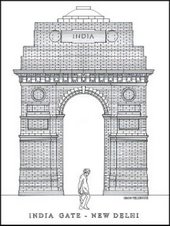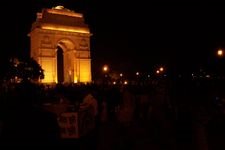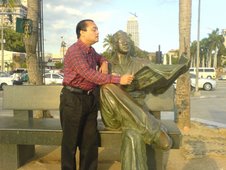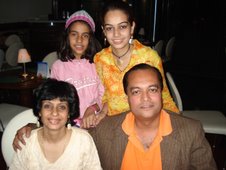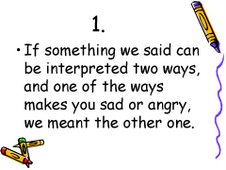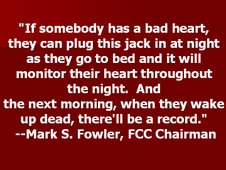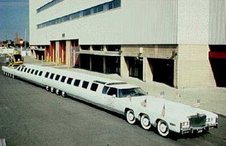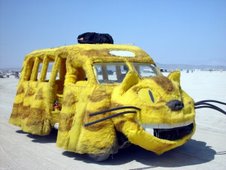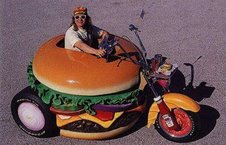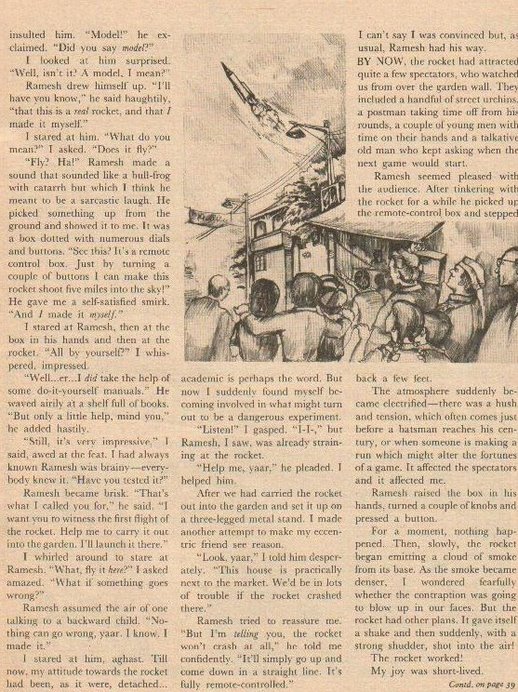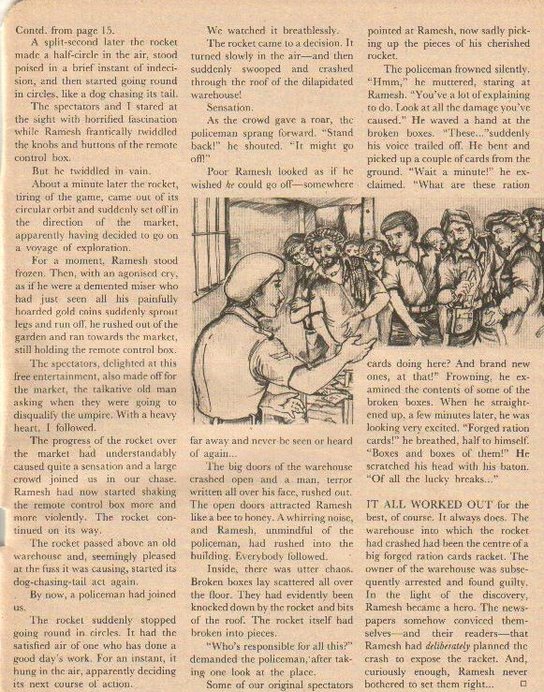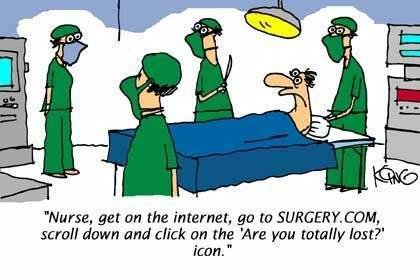
We were in the middle of breakfast, one morning, when the telephone rang.
My father picked up the receiver and almost immediately slammed it back into its cradle with a snort.
“Who was it?” asked my mother from the breakfast table.
My father irritably unfolded the newspaper. “Some idiot who shouted ‘the kangaroos are dancing’ and then cut the connection,” he replied.
My mother’s reaction was a mild “tut-tut” but mine was more forceful. I nearly choked over my egg sandwich. Hurriedly gulping down the remains of my breakfast and unmindful of my mother’s astonished look I rushed out of the house and, grabbing my cycle, pedaled off as fast as I could.
Ramesh was waiting for me at the gate of his house.
“What’s the matter?” I asked him, braking to a halt and dismounting. “Why the code?”
Ramesh beamed at me. His hair was looking more untidy than ever and there was a glint in his spectacles – always a sure sign of trouble.
“Come with me,” he said mysteriously. “I’ve got something to show you.”
Leaving my cycle locked and leaning against the gate I followed Ramesh to the big shed in the garden at the back of his house. With the air of high priest conducting a special ceremony, Ramesh threw open the door.
“Have a look inside,” he said. I stepped into the shed and peered short-sightedly around me. The shed had been converted into a workshop and the shelves were cluttered with mechanical junk of all kinds. But what held my attention was an object in the centre of the room. It was a silver-coloured cylindrical object – about three and a half feet tall – tapering off at the top into a needle-sharp point, with thin, wing-like projections at the base.
I am not one of those characters who go about pinching themselves that things are real, but if I were I would never have had a better opportunity or reason to pinch than right then.
The object I was looking at was a small rocket.

“Well?” Ramesh asked. “How do you like it?”
I gave a low whistle. “Wow!” I exclaimed. “That’s really a beautiful model.”
Ramesh looked as if I had just insulted him. “Model!” he exclaimed. “Did you say model?”
I looked at him surprised. “Well, isn’t it? A model, I mean?”
Ramesh drew himself up. “I’ll have you know,” he said haughtily, “that this is a real rocket, and that I made it myself.”
I stared at him. “What do you mean?” I asked. “Does it fly?”
“Fly? Ha!” Ramesh made a sound like that of bull-frog with a sour throat but which I think he meant to be a sarcastic laugh. He picked something up from the ground and showed it to me. It was a box dotted with numerous dials and buttons. “See this? It’s a remote control box. Just by turning a couple of buttons I can make this rocket shoot five miles into the sky!” He gave me a self-satisfied smirk. “And I made it myself.”
I stared at Ramesh, then at the box in his hands and then at the rocket. “All by yourself?” I whispered, impressed.
“Well…er…I did take the help of some do-it-yourself manuals.” He waved airily at a shelf of books. “But only a little help, mind you,” he added hastily.
“Still, it’s very impressive,” I said, awed at the feat. I had always known Ramesh was brainy – everybody knew it. “Have you tested it?”
Ramesh became brisk. “That’s what I called you for,” he said. “I want you to witness the first flight of the rocket. Help me to carry it out into the garden. I’ll launch it there.”
I whirled around to stare at Ramesh. “What, fly it here?” I asked amazed. “What if something goes wrong?”
Ramesh assumed the air of one talking to a backward child. “Nothing can go wrong, my friend. I know. I made it.”
I stared at him, aghast. Till now, my attitude towards the rocket had been, as it were, detached…academic is perhaps the word. But now I suddenly found myself becoming involved in what might turn out to be a dangerous experiment.
“Listen!” I gasped. “I-I,” but Ramesh, I saw, was already straining at the rocket.
“Help me,” he pleaded. I helped him.
After we had carried the rocket out into the garden and set it up on a three-legged metal stand. I made another attempt to make my eccentric friend reason.
“Look, Ramesh,” I told him desperately. “This house is practically next to the market. We’d be in lots of trouble if the rocket crashed there.”
Ramesh tried to reassure me. “But I’m telling you, the rocket won’t crash at all,” he told me confidently. “It’ll simply go up and come down in a straight line. It’s fully remote-controlled.”
I can’t say I was convinced but, as usual, Ramesh had his way.
By now, the rocket had attracted quite a few spectators, who watched us from over the garden wall. They included a handful of street urchins, a postman taking time off from his rounds, a couple of young men with time on their hands and a talkative old man who kept asking when the next game would start.
Ramesh seemed pleased with the audience. After tinkering with the rocket for a while he picked up the remote-control box and stepped back a few feet.
The atmosphere suddenly became electrified – there was a hush and tension, which often comes just before a batsman reaches his century, or when someone is making a run which might alter the fortunes of a game. It affected the spectators and it affected me.
Ramesh raised the box in his hands, turned a couple of knobs and pressed a button.
For a moment, nothing happened. Then, slowly, the rocket began emitting a cloud of smoke from its base. As the smoke became denser, I wondered fearfully whether the contraption was going to blow up in our faces. But the rocket had other plans. It gave itself a shake and then suddenly, with a strong shudder, shot into the air!
The rocket worked!
My joy was short-lived.
A split-second later the rocket made a half-circle in the air, stood poised in a brief instant of indecision, and then started going round in circles, like a dog chasing its tail.
The spectators and I stared at the sight with horrified fascination while Ramesh frantically twiddled the knobs and buttons of the remote control box.
But he twiddled in vain.
About a minute later the rocket, tiring of the game, came out of its circular orbit and suddenly set off in the direction of the market, apparently having decided to go on a voyage of exploration.

For a moment, Ramesh stood frozen. Then, with an agonized cry, as if he were a demented miser who had just seen all his painfully hoarded gold coins suddenly sprout legs and run off, he rushed out of the garden and ran towards the market, still holding the remote control box.
The spectators, delighted at this free entertainment, also made off towards the market, the talkative old man asking when they were going to disqualify the umpire. With a heavy heart, I followed.
The progress of the rocket over the market had understandably caused quite a sensation and a large crowd joined us in our chase. Ramesh had now started shaking the remote control box more and more violently. The rocket continued on its way.
The rocket passed above an old warehouse and, seemingly pleased at the fuss it was causing, started its dog-chasing-tail act again.
By now, a policeman had joined us.
The rocket suddenly stopped going round in circles. It had the satisfied air of one who has done a good day’s work. For an instant, it hung in the air, apparently deciding its next course of action.
We watched it breathlessly.
The rocket came to a decision. It turned slowly in the air – and then suddenly swooped and crashed through the roof of the dilapidated warehouse!
Sensation.
As the crowd gave a roar, the policeman sprang forward. “Stand back!” he shouted. “It might go off!”
Poor Ramesh looked as if he wished he could go off – somewhere far away and never be seen or heard of again…
The big doors of the warehouse crashed open and a man, terror written all over his face, rushed out. The opened doors attracted Ramesh like a bee to honey. A whirring noise, and Ramesh, unmindful of the policeman, had rushed into the building. Everybody followed.
Inside, there was utter chaos. Broken boxes lay scattered all over the floor. They had evidently been knocked down by the rocket and bits of the roof. The rocket itself had broken into pieces.
“Who’s responsible for all this?” demanded the policeman, after taking one look at the place.
Some of our original spectators pointed at Ramesh, now sadly picking up the pieces of his cherished rocket.
The policeman frowned silently. “Hmm,” he muttered, staring at Ramesh. “You’ve a lot of explaining to do. Look at all the damage you’ve caused.” He waved a hand at the broken boxes. “These…” suddenly his voice trailed off. He bent and picked up a couple of booklets from the ground. “Wait a minute!” he exclaimed. “What are these passports doing here? And brand new ones, at that!” Frowning, he examined the contents of some of the broken boxes. When he straightened up, a few minutes later, he was looking very excited. “Forged passports!” he breathed, half to himself. “Boxes and boxes of them!” He scratched his head with his baton. “Of all the lucky breaks…”

It all worked out for the best, of course. It always does. The warehouse into which the rocket had crashed had been the centre of a big forged passports racket. The owner of the warehouse was subsequently arrested and found guilty. In the light of discovery, Ramesh became a hero. The newspapers somehow convinced themselves – and their readers – that Ramesh had deliberately planned the crash to expose the racket. And, not surprisingly, Ramesh never bothered to set them right…




